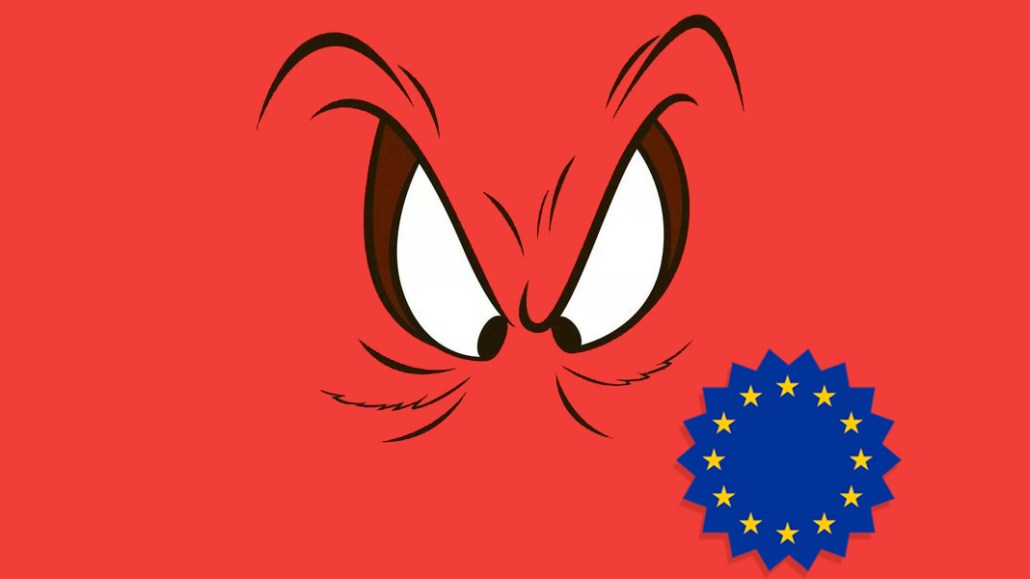Secure your place at the Digiday Media Buying Summit in Nashville, March 2-4

The Interactive Advertising Bureau Europe plans to establish an independent, nonprofit board of cross-industry stakeholders to govern the industry standard it devised for compliance with the General Data Protection Regulation.
The plan is to give publishers, agencies, ad tech vendors and advertisers equal representation in voting on issues that arise as businesses start to comply with the IAB Europe and IAB Tech Lab’s Transparency & Consent Framework.
For example, the framework’s ability to help with areas of GDPR compliance that affect a business’ ability to make money would be a likely subject for discussion.
The arrival of GDPR has caused confusion across the industry, with some companies interpreting the law far more strictly than others. When enforcement began May 25, demand levels dropped on ad exchanges, which many attributed to Google’s late decision to integrate into the IAB framework. The confusion will likely continue, which is why IAB Europe is calling for a separate body to oversee future GDPR framework compliance.
“GDPR is super vague, so there needs to be a code of the road: policies that bind anyone that is implementing the framework to make calls in a particular way at junctures where the law itself is not clear enough,” IAB Europe CEO Townsend Feehan said.
The IAB Europe and IAB Tech Lab’s GDPR framework wasn’t an immediate hit with publishers. Many felt its early version served ad tech vendors, which represent the majority of IAB members, over publishers. The IAB Europe subsequently worked with publishers to amend parts of the framework they were unhappy with. This effort included giving publishers more control over which vendors they work with and what purpose those vendors use their data for, along with making the framework compatible with publishers relying on the opt-out legitimate interest to fulfill their compliance.
By creating a body that represents all parts of the digital ad ecosystem equally, the IAB Europe hopes to erase any remaining publisher concerns that the framework doesn’t have their best interests at heart.
“We [IAB Europe] have been working on debunking the myth that the framework is a device to opt publishers back into an existing landscape where they don’t always know what’s going on, and it is some big take-it-or-leave-it package that we would foist upon them,” Feehan said. “It is not that. The framework must take into account everyone’s needs, or it isn’t sustainable.”
The planned nonprofit group doesn’t have any members or a formal outline confirmed. The plan is to invite people to join the “free-standing entity,” which will center on certain principles. Members will have voting rights to ensure no one group dominates the others. The idea is for the stakeholders to speak regularly via video conference and potentially meet in person three to four times a year, Feehan said. A location hasn’t yet been determined, but the IAB hopes to have an outline in place by the end of July, with the first meeting (either virtual or physical) happening in September.
“It has to be a cross-industry representation. It must be clear the ad tech part of the ecosystem cannot impose its will on others, and absolutely not on publishers,” Feehan said. “If publishers aren’t absolutely confident and serene we have nothing to sell, we understand that.”
The European Publishers Council welcomed the idea of an entity to oversee future compliance with the framework.
“It’s important that the governance of a cross-industry tool is transparent, and that it has the confidence of all participants, their users and their clients in the ecosystem,” said Angela Mills Wade, executive director of the European Publishers Council. “This can only really be achieved through an equal participation of the key players and through being separately owned and governed from the framework itself.”
To date, 375 vendors, over 100 consent management platforms and at least 15,000 publishers have committed to implementing the framework, according to the IAB Europe. If the stakeholders raise future issues that require technical changes, the IAB Europe can liaise with the IAB Tech Lab in the U.S., which looks after the technical iterations of the framework, Mills Wade added.
More in Media

From feeds to streets: How mega influencer Haley Baylee is diversifying beyond platform algorithms
Kalil is partnering with LinkNYC to take her social media content into the real world and the streets of NYC.

‘A brand trip’: How the creator economy showed up at this year’s Super Bowl
Super Bowl 2026 had more on-the-ground brand activations and creator participation than ever, showcasing how it’s become a massive IRL moment for the creator economy.

Media Briefing: Turning scraped content into paid assets — Amazon and Microsoft build AI marketplaces
Amazon plans an AI content marketplace to join Microsoft’s efforts and pay publishers — but it relies on AI com stop scraping for free.








